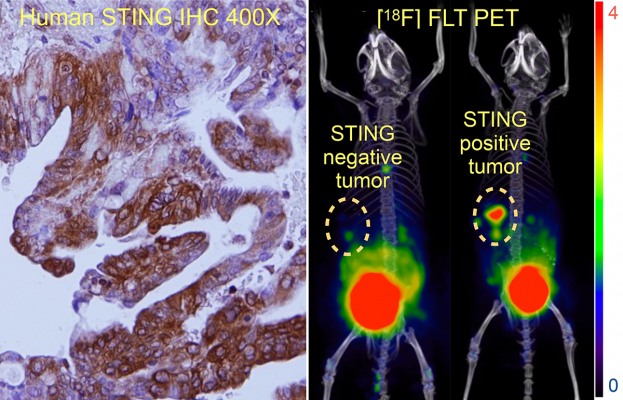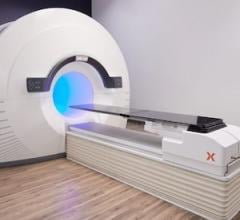
Image of a STING protein, courtesy of UCLA Jonsson Comprehensive Cancer Center
September 8, 2021 — A new study from scientists at the UCLA Jonsson Comprehensive Cancer Center found that emerging drugs that activate the protein STING, a well-established regulator of immune cell activation, substantially alter the activity of metabolic pathways responsible for generating the nucleotide building blocks for DNA. Researchers found that these alterations occur in cancer cells and can be visualized using [18F]FLT positron emission tomography (PET) imaging, marking the first time the effects of these drugs have been traced using a noninvasive imaging technique.
Understanding how STING agonists impact metabolic processes can help accelerate the clinical development of STING activating drugs in various therapeutic settings and guide the design of novel biomarkers and combination therapies.
Activation of the protein STING has emerged as a promising immuno-therapeutic strategy in cancer and multiple STING activating drugs are currently being studied for their ability to stimulate anti-cancer immune responses. While activators of STING are in development and being tested in clinical trials, the impact the drugs have on metabolic processes is still poorly understood. Until now, there has not been an effective way to detect any alterations in metabolic activity caused by STING activating drugs. Researchers have been seeking a noninvasive way to trace the effects of these drugs so they can better guide drug development.
The UCLA group utilized and integrated RNAseq transcriptomics and mass spectrometry metabolomics to systematically identify metabolic alterations triggered by interferon (a critical downstream effector of STING activation) in pancreas cancer cells. These orthogonal analyses pinpointed nucleotide metabolism a being significantly altered. Additional experiments confirmed that these metabolic effects can be visualized using [18F]FLT PET, a technique that enables the detection of a specific aspect of nucleotide metabolism in cells.
The study provides evidence that STING activating drugs have very potent effects on the activity of metabolic pathways in pancreas cancer cells. The observation that STING activation can be monitored non-invasively using [18F]FLT PET provides researchers and physicians with a new tool to track the duration and localization of the effects of STING agonists. This information can be used to fine-tune and customize treatments to help more people with hard-to-treat cancers and other diseases where STING activation may be beneficial.
For more information: cancer.ucla.edu


 February 13, 2026
February 13, 2026 









